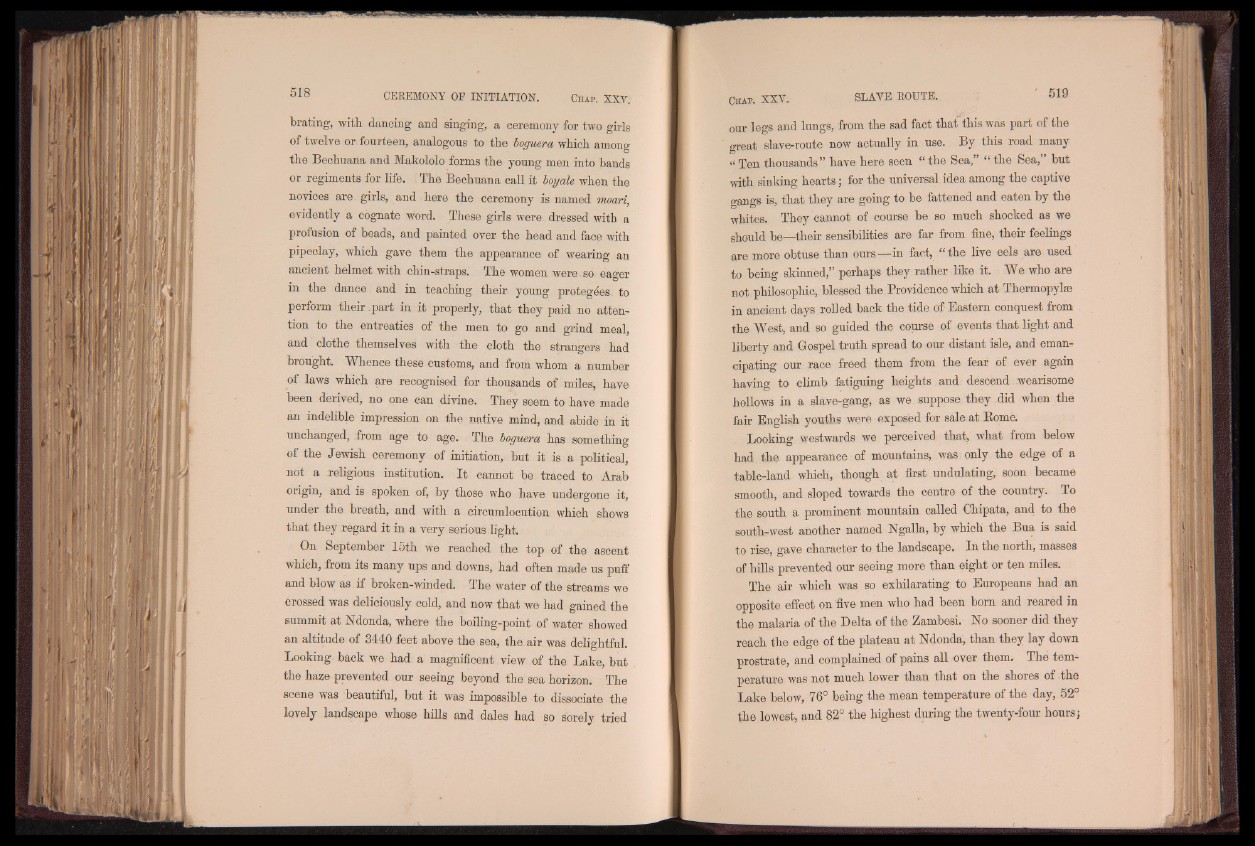
brating, with dancing and singing, a ceremony for two girls
of twelve or fourteen, analogous to the boguera which among
the Bechuana and Makololo forms the young men into hands
or regiments for life. The Bechuana call it boy ale when the
novices are girls, and here the ceremony is named moari,
evidently a cognate word. These girls were dressed with a
profusion of beads, and painted over the head and face with
pipeclay, which gave them the appearance of wearing an
ancient helmet with chin-straps. The women were so eager
in the dance and in teaching their young protegees to
perform their .part in it properly, that they paid no attention
to the entreaties of the men to go and grind meal,
and clothe themselves with the cloth the strangers had
brought. Whence these customs, and from whom a number
of laws which are recognised for thousands of miles, have
been derived, no one can divine. They seem to have made
an indelible impression on the native mind, and abide in it
unchanged, from age to age. The boguera has something
of the Jewish ceremony of initiation, but it is a political,
not a religious institution. I t cannot be traced to Arab
origin, and is spoken of, by those who have undergone it,
under the breath, and with a circumlocution which shows
that they regard it in a very serious light.
On September 15th we reached the. top of the ascent
which, from its many ups and downs, had often made us puff
and blow as if broken-winded. The water of the streams we
crossed was deliciously cold, and now that we had gained the
summit at Ndonda, where the boiling-point of water showed
an altitude of 3440 feet above the sea, the air was delightful.
Looking back we had a magnificent view of the Lake, but
the haze prevented our seeing beyond the sea horizon. The
scene was beautiful, but it was impossible to dissociate the
lgyely landscape whose hills and dales had so sorely tried
our legs and lungs, from the sad fact that this was part of the
great slave-route now actually in use. By this road many
« Ten thousands” have here seen “ the Sea, “ the Sea, but
with sinking hearts; for the universal idea among the captive
gangs is, that they are going to be fattened and eaten by the
whites. They cannot of course be so much shocked as we
should be—their sensibilities are far from fine, their feelings
are more obtuse than ours—in fact, “ the live eels are used
to being skinned,” perhaps they rather like it. We who are
not philosophic, blessed the Providence which at Thermopyke
in ancient days rolled back the tide of Eastern conquest from
the West, and so guided the course of events that light and
liberty and Gospel truth spread to our distant isle, and emancipating
our race freed them from the fear of ever again
having to climb fatiguing heights and descend wearisome
hollows in a slave-gang, as we. suppose they did when the
fair English youths were exposed for sale, at Borne.
Looking westwards we perceived that, what from below
had the appearance of mountains, was only the edge of a
table-land which, though at first undulating, soon became
smooth, and sloped towards the centre of the country. To
the south a prominent mountain called Ohipata, and to the
south-west another named Ngalla, by which the Bua is said
to rise, gave character to the landscape. In the north, masses
of hills prevented our seeing more than eight or ten miles.
The air which was so exhilarating to Europeans had an
opposite effect on five men who had been bom and reared in
the malaria of the Delta of the Zambesi. No sooner did they
reach the edge of the plateau at Ndonda, than they lay down
prostrate, and complained of pains all over them, The temperature
was not much lower than that on the shores of the
Lake below, 76° being the mean temperature of the day, 52°
the lowest, and 82° the highest during the twenty-four hours j